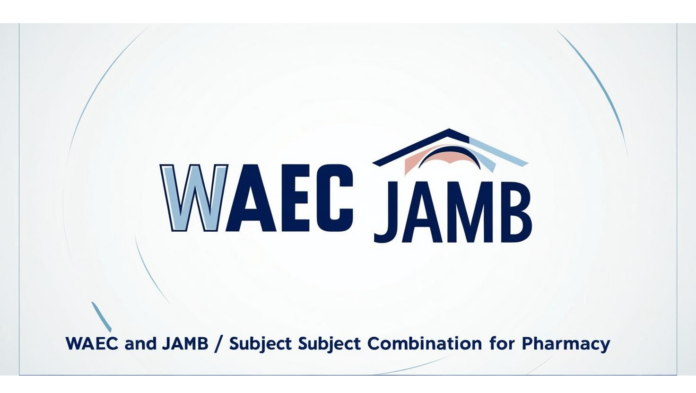Pharmacy is a highly sought-after course in Nigeria, providing a fulfilling career in the healthcare industry. However, gaining admission to study pharmacy at any Nigerian university requires meeting specific criteria, particularly in your O’level and JAMB exams. This article will cover the WAEC and JAMB subject combinations needed for pharmacy, along with the O’level requirements and direct entry options. Additionally, we will address some common questions about studying pharmacy in Nigeria.
JAMB Subject Combination for Pharmacy
To pursue a degree in pharmacy, you must register for and sit for four subjects in the UTME:
- English Language (compulsory for all courses)
- Physics
- Chemistry
- Biology
These subjects are essential for pharmacy, and a minimum UTME score of 200 is required to qualify for admission. However, due to the competitive nature of the course, securing a score higher than 200 will significantly improve your chances of gaining admission.
O’level Requirements for Pharmacy
To be eligible for a pharmacy program, you must have at least five credits in your O’level examinations, including the following core subjects:
- English Language
- Mathematics
- Physics
- Chemistry
- Biology
These subjects are essential for admission into any pharmacy program in Nigeria.
Direct Entry Requirements for Pharmacy
Direct Entry Requirements for Pharmacy
If you have a higher qualification such as a National Diploma (ND), Higher National Diploma (HND), or a Bachelor’s degree in a related field, you may qualify for direct entry admission into pharmacy without taking the UTME. The requirements include:
- ND or HND in Science Laboratory Technology, Pharmaceutical Technology, or related fields, with a minimum of upper credit.
- Bachelor’s degree in Chemistry, Biochemistry, Microbiology, Zoology, Botany, or similar disciplines, with at least a second-class lower division.
- A-level or IJMB passes in Physics, Chemistry, and Biology, with a minimum of 10 points.
Additionally, you must obtain a direct entry form from JAMB and apply to your preferred university through the JAMB portal.
Top 10 Universities in Nigeria to Study Pharmacy
Here are some of the best universities in Nigeria for studying pharmacy, along with their admission requirements:
- University of Lagos (UNILAG)
- University of Nigeria, Nsukka (UNN)
- Obafemi Awolowo University (OAU)
- University of Ibadan (UI)
- University of Benin (UNIBEN)
- Ahmadu Bello University (ABU)
- University of Jos (UNIJOS)
- University of Port Harcourt (UNIPORT)
- Nnamdi Azikiwe University (UNIZIK)
- Olabisi Onabanjo University (OOU)
These universities have strong pharmacy programs and require candidates to meet specific O’level, JAMB, and direct entry requirements for admission.
Frequently Asked Questions About Pharmacy
Which Subject is Best for Pharmacy in JAMB?
The Joint Admissions and Matriculation Board (JAMB) is responsible for university entrance examinations in Nigeria. To study pharmacy, candidates must focus on four key subjects:
- Chemistry (a core subject for understanding drug composition and reactions)
- Biology (essential for comprehending the human body and pharmacodynamics)
- Physics (important for grasping drug interactions and medical equipment usage)
- Mathematics (crucial for pharmaceutical calculations and drug dosages)
A high score in these subjects significantly increases the chances of securing admission to study pharmacy at a university.
What Are the Subjects Needed for Pharmacology in JAMB?
Pharmacology, a branch of pharmacy focused on drug actions and effects, also requires specific subjects in JAMB, including:
- Chemistry (central to the study of drug formulations and properties)
- Biology (important for understanding drug effects on living organisms)
- Physics (necessary for grasping the physical properties of drugs)
- Mathematics (important for calculations related to drug dosages and concentrations)
These subjects provide a solid foundation for pursuing a degree in pharmacology.
How Many Years is a Pharmacy Course in Nigeria?
A Bachelor of Pharmacy (B.Pharm) degree in Nigeria generally takes five years to complete. However, the more advanced Doctor of Pharmacy (PharmD) program requires six years. These programs include academic coursework, practical laboratory sessions, and internships in hospitals or pharmaceutical industries.
How Much Does It Cost to Study Pharmacy in Nigeria?
The cost of studying pharmacy in Nigeria varies based on the university:
- Public Universities: Tuition fees range from ₦300,000 to ₦500,000 per year.
- Private Universities: Tuition fees range from ₦500,000 to ₦1,000,000 per year.
Additional costs include accommodation, textbooks, laboratory fees, and other miscellaneous expenses.
Which Universities Offer a Doctor of Pharmacy (PharmD) in Nigeria?
Several Nigerian universities offer the PharmD program, including:
- University of Lagos (UNILAG)
- University of Nigeria, Nsukka (UNN)
- University of Benin (UNIBEN)
- Obafemi Awolowo University (OAU)
- University of Ibadan (UI)
- Madonna University
Students interested in PharmD should check each university’s admission requirements before applying.
Which is the Best Course in Pharmacy?
The Doctor of Pharmacy (PharmD) is widely regarded as the best and most advanced degree in pharmacy. It focuses on clinical pharmacy, patient care, and direct patient interactions. Other specialized courses in pharmacy include:
- Pharmaceutical Chemistry
- Pharmacognosy (study of medicinal plants)
- Clinical Pharmacy
- Pharmaceutical Technology
What Faculty is Pharmacy Under?
- Pharmacy is usually housed under one of the following faculties, depending on the university:
- Faculty of Pharmaceutical Sciences
- Faculty of Clinical Pharmacy
- Faculty of Health Sciences
- The faculty structure varies among different universities, but the curriculum remains similar.
Is a Doctor of Pharmacy (PharmD) the Same as a Bachelor of Pharmacy (B.Pharm)?
- No, there is a difference between the two degrees:
- B.Pharm (Bachelor of Pharmacy): An undergraduate degree typically completed in five years.
- PharmD (Doctor of Pharmacy): A professional doctorate degree that takes six years and includes advanced clinical training.
- PharmD graduates are more equipped for clinical roles in hospitals and direct patient care.
How Can You Convert a B.Pharm to a PharmD?
- Graduates with a B.Pharm degree can upgrade to a PharmD by enrolling in a 2-year PharmD post-baccalaureate program. Several universities offer this conversion program, allowing graduates to gain clinical training and professional advancement.
How Many Years Does It Take to Study Pharmacy in the USA?
- In the United States, pharmacy education follows this path:
- Pre-Pharmacy Coursework: 2-4 years of undergraduate prerequisite courses.
- Doctor of Pharmacy (PharmD) Program: 4 years of pharmacy school.
- Post-Graduation Training: 1-2 years of residency for specialized training.
- Pharmacists in the USA must pass licensing exams to practice professionally.
Which Course is Best After Completing a PharmD?
- After earning a PharmD, graduates can pursue further studies or specializations such as:
- Master of Business Administration (MBA) in Pharmacy Management
- Master of Pharmacy (M.Pharm) in Pharmacology or Clinical Pharmacy
- Doctor of Philosophy (PhD) in Pharmacy
- Postgraduate Diplomas in Regulatory Affairs, Hospital Pharmacy, or Industrial Pharmacy
- These advanced courses enhance career prospects in pharmaceutical research, academia, and hospital pharmacy.
Conclusion
Pharmacy is one of the most competitive yet fulfilling courses to study in Nigeria. To pursue this career path, you must meet specific academic requirements in both JAMB and O’level examinations.
For your JAMB UTME, you’ll need to register and sit for four compulsory subjects: English Language, Physics, Chemistry, and Biology. Additionally, your O’level results (WAEC, NECO, or equivalent) must include at least five credits in the following core subjects: English Language, Mathematics, Physics, Chemistry, and Biology.
If you hold a higher qualification (such as A’levels, ND, or NCE in relevant fields), you may qualify for Direct Entry (DE) admission, depending on the university’s specific requirements.
We hope this guide clarifies the WAEC and JAMB subject combination for Pharmacy. If you have any questions or need further assistance, drop a comment below—we’d love to help! Best of luck on your journey to becoming a pharmacist!




